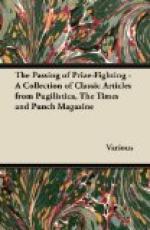It was not her fault if, in the night scene, amid a generous exposure of physical facts, we missed the less palpable atmosphere of impending doom. Certainly the Holofernes of Mr. CLAUDE KING never for a moment suggested it. I admit that I had not hitherto seen an Assyrian officer making love on the edge of his grave and so had no exact precedent to go by, but this officer, with his face far too well groomed for the conclusion of a heavy banquet, and those rather anaemic and perfunctory gestures of endearment, which had nothing to do with the sombre forces of elemental passion, gave no hint of the sinister workings of Fate.
This lack of atmosphere pervaded G.H.Q. Apart from Miss MCCARTHY, Mr. THESIGER, whose performance as Bagoas must have astonished those who only knew him on the stage as a frivolous flaneur, was the sole character who conveyed any sense of the general uncanniness of things.
Mr. ARNOLD BENNETT’S own novelties—the very rapid fraternization of Judith’s little Cockney maid with the enemy; her own inexplicable love-at-first-sight for an Ammonite pervert; the laborious pretentiousness of Ozias, the Governor of Bethulia; the tedious garrulity of the oldest inhabitant, and the topical reference, in the manner of pantomime, to the War of 1914-1918 A.D.—these offered no great improvement on the original narrative. On the other hand his neglect to show us the head of Holofernes, which constitutes so dramatic a property in the Book of Judith, was a noticeable omission. But perhaps he was well-advised to leave it out, for I thought I detected the significant presence of Mr. BILLING in the stalls.
[Illustration: MANUAL EXERCISE.
Bagoas (MR. THESIGER). “CANST DO THIS WITH THY HANDS, WOMAN?”
Judith (MISS LILLAH MCCARTHY). “NAY, MIGHTINESS, THY SLAVE CAN DO NO BETTER THAN THIS POOR TRICK.”]
I ought perhaps to add that there was a Messenger whose refinement of speech greatly struck me. He said that he came from Jerusalem, but he sounded as if he came from Balliol.
O.S.
* * * * *
“A party of police have
been stationed in and around the
premises, and to-day their
number were augmented by a party of
Scottish Horse Marines.”—Cork
Paper.
We are glad to see this historic unit bobbing up again.
* * * * *
C.K.S. AND U.S.A.
The news that our own and only C.K.S.—the “Great Clem of Literature,” and the “Wee Cham of Literature,” as he is alternatively and affectionately known to the members of the Johnson Club—was on his way to America aroused the liveliest excitement among our fellow-war-winners, and preparations on a grand scale were made for his reception. The statue of Liberty was transformed to resemble Mnemosyne (pronounced more or less to rhyme with limousine), the mother of the Muses, and a bodyguard of poets, novelists, writers, journalists and brainy boys generally was drawn up on the quay.




